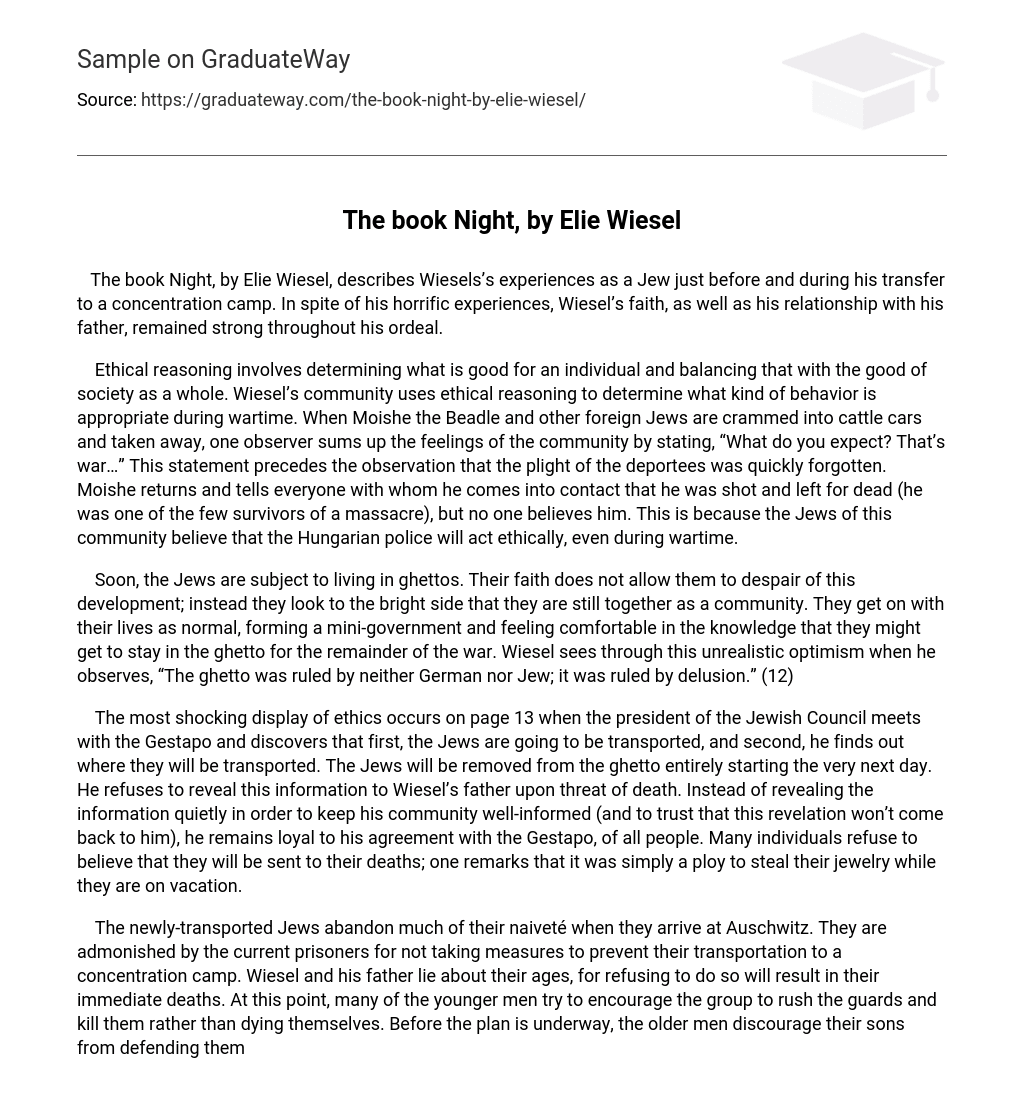The book Night, by Elie Wiesel, describes Wiesels’s experiences as a Jew just before and during his transfer to a concentration camp. In spite of his horrific experiences, Wiesel’s faith, as well as his relationship with his father, remained strong throughout his ordeal.
Ethical reasoning involves determining what is good for an individual and balancing that with the good of society as a whole. Wiesel’s community uses ethical reasoning to determine what kind of behavior is appropriate during wartime. When Moishe the Beadle and other foreign Jews are crammed into cattle cars and taken away, one observer sums up the feelings of the community by stating, “What do you expect? That’s war…” This statement precedes the observation that the plight of the deportees was quickly forgotten. Moishe returns and tells everyone with whom he comes into contact that he was shot and left for dead (he was one of the few survivors of a massacre), but no one believes him. This is because the Jews of this community believe that the Hungarian police will act ethically, even during wartime.
Soon, the Jews are subject to living in ghettos. Their faith does not allow them to despair of this development; instead they look to the bright side that they are still together as a community. They get on with their lives as normal, forming a mini-government and feeling comfortable in the knowledge that they might get to stay in the ghetto for the remainder of the war. Wiesel sees through this unrealistic optimism when he observes, “The ghetto was ruled by neither German nor Jew; it was ruled by delusion.”
The most shocking display of ethics occurs on page 13 when the president of the Jewish Council meets with the Gestapo and discovers that first, the Jews are going to be transported, and second, he finds out where they will be transported. The Jews will be removed from the ghetto entirely starting the very next day. He refuses to reveal this information to Wiesel’s father upon threat of death. Instead of revealing the information quietly in order to keep his community well-informed (and to trust that this revelation won’t come back to him), he remains loyal to his agreement with the Gestapo, of all people. Many individuals refuse to believe that they will be sent to their deaths; one remarks that it was simply a ploy to steal their jewelry while they are on vacation.
The newly-transported Jews abandon much of their naiveté when they arrive at Auschwitz. They are admonished by the current prisoners for not taking measures to prevent their transportation to a concentration camp. Wiesel and his father lie about their ages, for refusing to do so will result in their immediate deaths. At this point, many of the younger men try to encourage the group to rush the guards and kill them rather than dying themselves. Before the plan is underway, the older men discourage their sons from defending themselves by saying, “We mustn’t give up hope, even now as the sword hangs over our heads. So taught the sages…” Even in the face of certain death, many Jews felt that they owed it to their faith to persevere without resorting to violence themselves.
Wiesel has a close relationship with his father, even going so far as to stay with his father when he has the option of remaining under the possible protection of his mother once he arrives at Auschwitz. His father stays strong for him, even when he is attacked just for asking where the toilets are located. “It doesn’t hurt,” he tells Wiesel, even though the mark from the blow is observable. When being assigned to a job, Wiesel insists that his father work by his side, and he is granted this favor.
The Gestapo were well aware that it was best to have prisoners as leaders within the camp. Some leaders, such as Alphonse, refused to take advantage of this small freedom and tried to sneak extra food to the occupants of his block. Others abandoned their beliefs and tried to profit by, in one instance, trading in the prisoner’s gold teeth. The Jews who were tortured, starved and given no extra privileges at all remained true to their faith while the men given a few privileges quickly abandoned their beliefs and took advantage of their fellow Jews. This was demonstrated on page 60 when the group of prisoners, save one, refused to touch two large cauldrons of soup that were left out, unguarded. This is the nature of wartime ethical reasoning.
In spite of being starved, watching frequent hangings and being tortured, most of the Jews tried to observe the tenents of their faith by saying Kaddish and debating whether or not to fast on Yom Kippur, in spite of the fact that they could not afford to miss a single meal at this point. Wiesel eats his crust of bread, but refers to it as “I turned that act into a symbol of rebellion, of protest against Him.” Wiesel questions his faith, though he does not abandon it altogether.
The subsequent evacuation shows what many Jews are made of, as one abandons his father in the long Gestapo-ordered run while Wiesel grudgingly and futilely tries to keep his father alive. The Jews’ ethical reasoning changed in reaction to their circumstances, but they continued to apply ethical standards to each situation in which they found themselves. Wiesel, unlike his father, survives the camp until it is liberated by the Americans. Still alive today, Elie Wiesel is a Nobel Peace Prize winner who has written many books about the plight of the Jews in particular and hate crimes in general. Wiesel took his experiences at Auschwitz and Buchenwald and made the world aware of the consequences of such hate.





